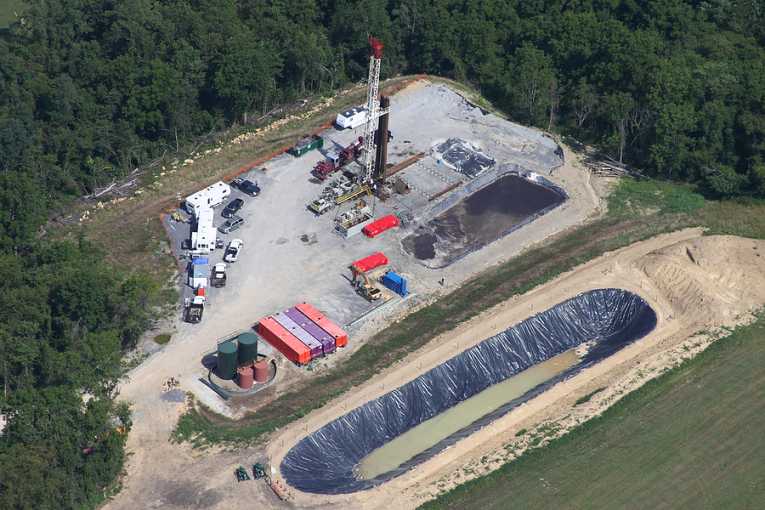The eye-catching numbers were lain down thick-and-fast during yesterday's announcement by Caudrilla Resources. The shale gas exploration company was loudly proclaiming the results for its fracking tests beneath Lancashire's fields. More than 200 trillion cubic feet of gas, enough to supply the UK with all of its gas for the next 50 years, have been found in shales 10,000 feet below ground. Developing these reserves would bring 5,600 jobs to this corner of NW England, each paying an average of £55,000 and helping to pump up to £6 billion into the UK's tottering economy.
Mouth-watering numbers
For Lancashire, an often-neglected part of the country, those are big and tempting numbers. And for a UK government eager for economic 'good-news' stories - not to mention a dollop of extra tax revenue - the prospects look pretty mouth-watering too. Little wonder that Tim Yeo, chair of the House of Commons' Committee saw it all as "very good news", and was already leaping over the hurdles that lie between the press release and the pumping of gas.
When asked by the FT about whether shale gas production should now be given the green light, he said "I see no practical or regulatory reason why we should not." Except that there are more than a few specks of dirt clogging up the push for the development of this ostensibly 'clean gas'.
Lessons from the US
For a start, for all of the gushing at Caudrilla's press conference, the 200 trillion cubic foot figure refers not to gas they'll be able to pump out - but to the 'gas-in-place'. Most of that is likely to stay under ground - often 90% is unrecoverable from such shale gas plays. Those all-important recoverable reserve numbers have yet to be decided - in part because testing on the fracking of gas from these rocks has had to be halted. As the tests were taking place, Blackpool experienced some real physical tremors, as two small earthquakes struck the area.
An investigation into the connection between those earth-movements, and Caudrilla's fracking has yet to be completed. But similar such episodes have been reported from the US. Of course, it was in the US - with the experiences of local residents squeezed in between the blossoming shale gas wells - that fracking first earned its bad press. Everything from waste-water spills to depletion of local water reserves, to tap-water that leaps into flames, was reported from many of the most 'fracked' parts of the US.
Not that such environmental concerns are to be worried about in the UK. "We have a good history of sensible regulation in this country," Mr Yeo said. "Once people have overcome their anxieties about the technology - which I suspect they will do - I see no reason why they shouldn't start." Even if such a misplaced - and frankly patronizing - optimism in the UK's regulatory authorities proves well-founded, Mr Yeo appears to be missing the bigger picture here.
Not so clean after-all
That wider horizon is one that must encompass global warming, too. Shale gas has gained a firm foothold to the claim of being a 'clean gas', especially in the eyes of those in charge of energy policy. Partly that's because natural gas - or methane - is indeed a clean-burner, when it comes to CO2 emissions. Much less CO2 is released from combustion of gas than for burning coal.
However, a study out only two weeks ago casts doubt on the idea of shale gas as a savior, from the planet-gobbling coal. When researcher Tom Wigley, at the National Center for Atmospheric Research looked at the consequences for the climate, of switching to the 'bridge fuel' that shale gas is now touted as, he found a surprisingly muted affect on global temperatures. In fact, his models implied that temperatures would rise faster as a result, for the first few decades.
That's because some of the dirt in coal is good dirt - from the climate's perspective, at least. The sulfate haze that comes from the burning of coal actually has a slight cooling effect. If coal-burning was replaced with natural gas, those sulfates would drop out - and warming overall would actually pick up. That's despite there being less CO2 pumped out. But there is another odd effect at play too - because CO2 is not the only greenhouse gas.
Methane is right up there in the planet-warming stakes, especially in the short-term, when it can be 20 times as powerful at capturing the sun's heat as CO2. And natural gas, whether from shales, or from conventional gas reserves, is methane - and it is more leaky than coal. Gas escapes are a big problem all along the transport route, from well-casing to gas-cooker. That can add significantly to its warming potential. There are also good reasons to believe that the fracking process itself boosts those methane leaks - just ask the guy whose tap-water can now be set alight.
Sustainable gains or boom-time mess?
So there's more to the case for fracking than short-term economic gains, or even local environmental problems. There's the planet to consider too. Will the predicted 800 wellheads, pumping out the shale gas, bring money and jobs to the north-west of England? Absolutely - though maybe not for as long, and for as many locals, as Caudrilla would want Lancashire's residents to believe.
But jobs and money can also come courtesy of accelerating moves towards a clean, green modern economy. And that way local communities, the economy and the climate, can all benefit. Short-term boom versus long-lasting and wide-ranging gains - only a fool would rush this one.
Green Opinion is an Earth Times Blog. The views and opinions expressed in this article are those of the author.
Top Image Credit: Shale gas drilling well © shutterrudder










